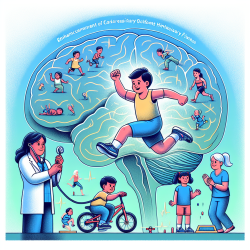Introduction
In the realm of speech-language pathology and online therapy services, data-driven decisions are crucial for creating impactful outcomes. This blog post explores the potential of community engagement (CE) as a transformative tool for improving maternal health and, by extension, child outcomes. Drawing insights from the Community Level Interventions for Pre-eclampsia (CLIP) Trial in India, we will discuss how practitioners can harness these findings to enhance their skills and advocate for further research.
Understanding the CLIP Trial
The CLIP Trial, conducted in rural Karnataka, India, aimed to evaluate the impact of community engagement on pre-eclampsia knowledge, birth preparedness, and maternal health outcomes. Despite the trial's focus on maternal health, its implications extend to child health, highlighting the interconnectedness of community support and health outcomes.
Key Findings and Implications
- Community Engagement's Reach: The trial demonstrated the feasibility of engaging pregnant women, household decision-makers, and community stakeholders. This broad engagement is crucial for shifting community attitudes towards maternal health and ensuring better outcomes for children.
- Knowledge and Preparedness: While the trial showed limited impact on individual knowledge of pre-eclampsia, it highlighted the importance of birth preparedness and community support. Practitioners can leverage these insights to advocate for comprehensive community-based interventions.
- Barriers and Challenges: The trial also revealed barriers such as poverty and health infrastructure gaps. Addressing these challenges requires a multifaceted approach, integrating community engagement with policy changes and resource allocation.
Integrating Findings into Practice
For practitioners in speech-language pathology and online therapy services, integrating the principles of community engagement can enhance service delivery and outcomes. Here are some actionable steps:
- Collaborative Approaches: Foster partnerships with community stakeholders, including parents, educators, and healthcare providers, to create a supportive network for children receiving therapy.
- Awareness and Education: Develop educational materials and workshops to raise awareness about the importance of early intervention and therapy services, drawing parallels with the trial's focus on maternal health education.
- Advocacy and Research: Encourage further research into the impact of community engagement on child health outcomes, advocating for policy changes that support integrated care models.
Conclusion
The CLIP Trial's insights into community engagement offer valuable lessons for improving child health outcomes through online therapy services. By adopting a holistic approach that includes community support, education, and advocacy, practitioners can drive meaningful change and enhance the well-being of children.
To read the original research paper, please follow this link: Community engagement for birth preparedness and complication readiness in the Community Level Interventions for Pre-eclampsia (CLIP) Trial in India: a mixed-method evaluation.










